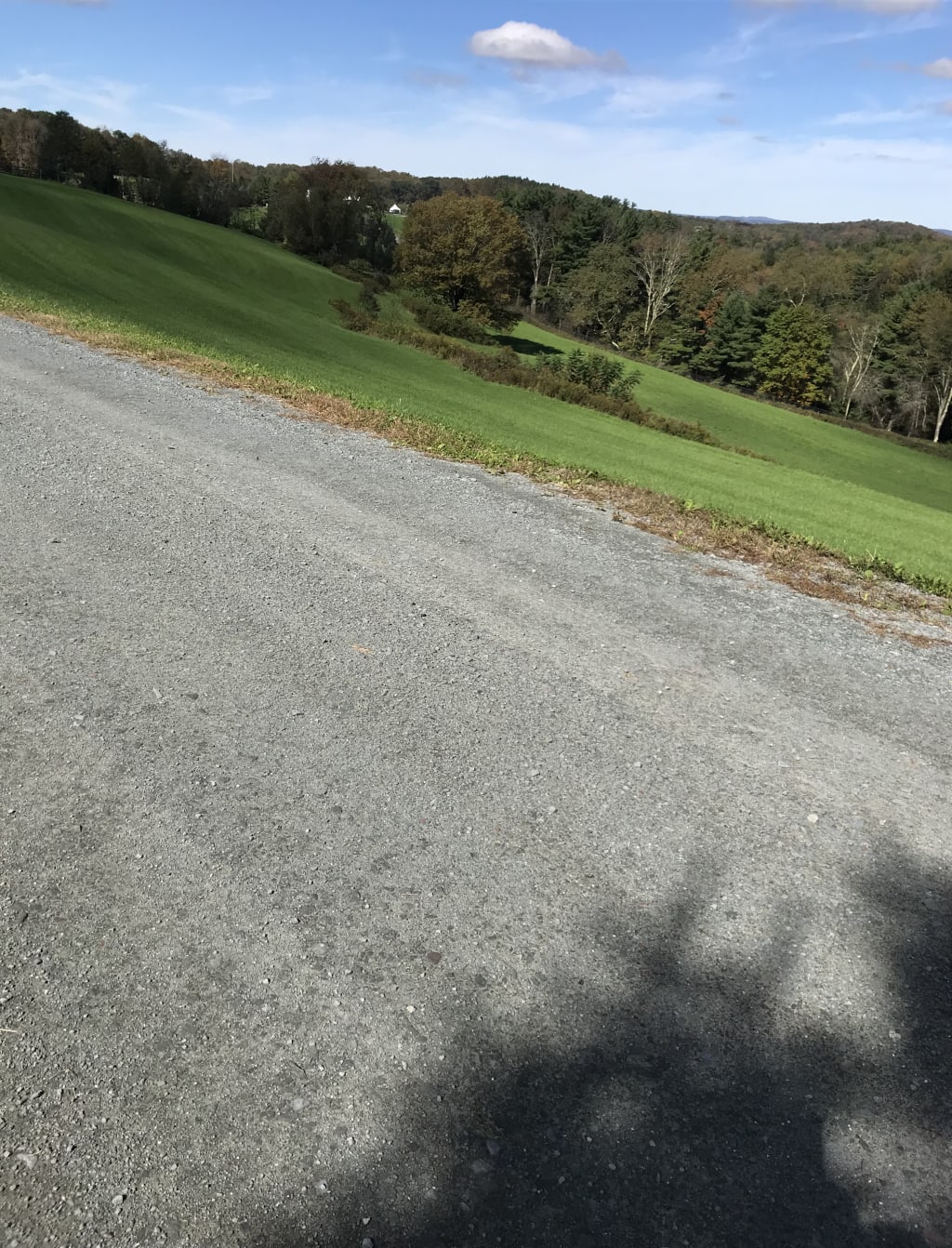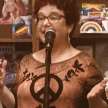
Lucille looked down at the cast iron skillet on top of her range. “Sunnyside up,” she whispered.
That is what her grandmother used to call fried eggs. She held the brown shelled egg in the palm of her right hand and thought, I’ve never tasted a fried egg as good as my grandmother made. She sighed. “And I’ve never been able to duplicate her technique,” she muttered.
She placed the room temperature egg in the ramakin. She leaned against the counter and thought about the moment the egg slid out of the pan on onto her plate. The white had a crispy line around the edge, and the yolk was a bright yellow mound. She would prick it with her fork, and it would ooze out, hot. Then she would dip a piece of toast into it and the yolk would drip down and dry on her chin.” She smiled at the memory. “Her grandmother would wipe her chin and say, “You are just like your mother; you eat up to your elbows.”
The final exam of the final course at the culinary institute was not a surprise to the few students left in her class. More than half had dropped out during the pastry course. Tradition had it that you could not be bestowed the title “Chef” until you proved you knew how to cook a perfect egg.
Each person in her class knew that after months of preparing gourmet dishes with precision technique, their future in the culinary world all came down to one ingredient: the egg. What was not revealed was which preparations each novice would receive. Each would be given two out of five possibilities: boiled in the shell, baked, poached, fried, and omelet.
She knew others had been practicing for days, cracking dozens of eggs, recording their wrist techniques in the cracking of those eggs. She knew they watched intricate YouTube videos and tried to replicate what they saw. Lucille however, had not cracked a single egg and had not looked beyond what her instructor had demonstrated for them in the culinary academy’s kitchen.
It was not that Lucille felt particularly confident about the task she would be asked to perform in just a few hours—it was more the familiarity of the ingredient. Eggs had been a part of Lucille’s life, her entire life.
*****
The color of a hen’s feet and beak turn from pale to dark yellow when the hen quits laying eggs. Lucille was nine when her father began allowing her to select the hens with the darkest yellow feet for the family’s Sunday meals.
With corn in her left hand, she would entice the hen to her. As the hen pecked the kernels from her left hand, Lucille would reach over the bird and underneath it, cradling its breast as she lifted it up to her waist. The trick was to move slowly and gently so that the hen wouldn’t be distracted from the corn. As she carried the hen to her father, Lucille’s four sisters and her mother always smiled their approval.
Lucille’s father, Grant, didn’t smile much. Her mama said it was because he didn’t have a son. “A man needs a son to carry on,” her mama said, repeating his words.
Grant would take the hen by the feet with his left hand, hold it upside down, and shake it. Then, he would grab the hen’s head with his right hand, raise the bird to his mouth, and whistle into its ear.
“Why does Papa shake and whistle, Mama?” the youngest, Mary Elizabeth asked.
“To scare the chicken, child. Makes her bleed better,” Mama replied.
After the whistle, Grant wrung the hen’s neck by holding it by the head and swinging it around above his head until the centrifugal force separated the head from the body. The headless chicken would land in the barnyard and immediately jump up and run in circles, its three-inch skinless, featherless red neck squirted blood in patternless gouts as it danced around. Often, it would stumble hard against the fence, fall over, bound up, and run in circles again before finally collapsing.
“Mama, how come it can run around so long when it don’t have a head?” Sally, two years older than Lucille wanted to know.
“’Cause your papa knows how to scare it good.”
“Why does he scare it?” Becky, the girl born between Sally and Lucille asked.
“When it’s scared and excited, its heart beats faster, pumping the blood out of the meat.”
“I don’t like it,” Lucille said.
“You’d like it less iffen you had to eat bloody chicken,” Mama said.
“Mama, how come we don’t ever wring a rooster’s neck? They don’t lay eggs,” Sally asked.
“The rooster’s job is to keep the hens happy. Happy hens lay eggs.”
“Mama, that hen seemed happy to me. She was fatter and quieter than the rest,” Lucille observed.
“Lucille, she was fat because the feed wasn’t going to eggs. A hen that don’t lay ain’t good for nothing but the frying pan.”
“How does a rooster keep the hens happy and laying?” Mary Elizabeth asked
“Hush, child, you’ve asked enough questions for one day.” She turned to her eldest daughter, Sally it’s your turn to pluck—soon as Papa boils up the vat. Once them feathers gone, bring me the liver and gizzard.” She turned and stomped back to the house, Mary Elizabeth trailing behind her.
Lucille didn’t mind the smell of manure, or rotting vegetables, but she detested the smell of plucking chicken, it made her gag. She was grateful the chore had not come to her—yet.
When she turned ten, the chore of plucking the headless chicken for Sunday dinner became her responsibility. One she shared with Sally every other week.
She left the yard and headed over to the pasture to check on Lucy. Lucy the calf was born from Mama Red, Papa’s favorite cow, on Lucille’s sixth birthday. Mama Red was the ugliest cow Lucille had ever seen. Her hair had no shine or luster, her ears had been chewed up by wild dogs, but what was worse, she was all skin and bones. To Lucille, she appeared to be a skeleton painted red, with a big udder that resembled a pink cookpot with four white legs.
“Mama, how come Papa likes Mama Red so much?” Lucille asked one day.
“Because she never misses a calving season, and her calves are the fattest on the place.”
“How can a skinny cow have fat calves?”
“The milk. She gives more of it, and she gives it longer.”
“Why longer?”
“Most cows kick the calf off when it starts teething. Not Mama Red. She just lets ’em chew and suck away.”
Lucy was the prettiest calf Lucille had ever seen. She was dropped by Mama Red within the blink of an eye and licked clean in ten minutes. She had curly white hair all over her face that made her calf eyes seem even larger. The rest of her body was red like her mama’s.
“Lucille, being it’s your birthday, you can name the calf,” Mama told her.
“Mama, I want to name her Lucy.”
“Lucy it’ll be, child.”
“Mama, it Lucy like Lucille?”
“Kinda sounds like, don’t it?”
Lucy was a gentle calf. She let Lucille walk up and pet her any time. Lucille would brush her clean when she knew no one was looking who might laugh. On Lucille’s seventh birthday, Lucy weighed approximately six hundred pounds, according to Papa, who declared she was by far the prettiest heifer he’d ever seen. When Lucille was anywhere near, Lucy would follow her around and nudge her with her wet nose until Lucille scratched her ears.
Sometime between Lucille’s sixth and ninth birthdays, Lucille assumed that Lucy belonged to her. She remembered that her present was being allowed to name the calf—but wasn’t that the same? If you named it, wasn’t it yours? she wondered. It was true that none of her sisters had a calf, but there hadn’t been any calves born on their birthdays. If there had been a calf dropped on their birthdays, maybe they would own one too, she reasoned.
She thought about asking Papa if Lucy was hers or not, but was concerned he might say no? It was more fun to assume Lucy was her pet. Besides, Lucy was so pretty and fat that she was certain that Papa would keep her forever.
One night at dinner she heard him tell her mama, “That three-year-old white-faced heifer didn’t take seed.”
“Papa, you mean Lucy?” Lucille asked.
He glanced around at her. “Iffen that be Mama Red’s three-year-old white-faced heifer.”
“What does it mean when she don’t take seed?”
“It means, young’un, she ain’t going to have a calf come spring. It means she’s without calf. It means she is barren. It means she’s going to slaughter.”
Stricken, Lucille pleaded, “No, Papa, no! Give her another chance. Next year she will.”
“There ain’t going to be no next year for her. Mr. Rochelle saw how fat she was, and when I told him she didn’t take seed, he wanted her slaughtered. You hear?”
Lucille was numb. Tears slipped down her cheeks, but she didn’t argue. She knew that when Papa used Mr. Rochelle’s name, it was final. Mr. Rochelle owned the farm. No one questioned him. Not in the winter when he wore his black suit, black shoes, and black tie, and not in the summer when he wore his white suit, white shoes, and white tie.
“Quit your crying, child. Mr. Rochelle is going to use the meat for his own table. You should be pleased. Besides, if you hadn’t been sneaking out and feeding her the chickens’ corn she wouldn’t be so fat, and Mr. Rochelle would never have noticed her. No one to blame but yourself.”
The first time Lucille ran away was the day Mr. Rochelle came with this pickup truck and trailer to take Lucy away. Sally was sent to look for her and convinced Lucille to come home, take the lickin’ she was going to get from Papa, and lay low.
A year later, Mr. Rochelle sold his property to developers and told Lucille’s family they had two weeks to vacate the property. The four girls were scattered to different family members. Lucille was put on a train in Topeka, and four state borders later, found herself living with her maternal grandmother in Kentucky. During the day she attended school, evenings and weekends she worked in her grandmother’s diner.
*****
I’ve never been able to duplicate her technique. I can get the white right, but the center is always cold, Lucille mused.
She went over to the refrigerator and pulled out the carton of eggs and a stick of corn oil margarine instead of butter. She took the egg out of the ramekin and tossed it into the compost bucket on the countertop. She opened the egg carton and studied the each one of the fresh eggs, then she made her selection. With an imperceptible move of her wrist she cracked the egg on the side of the bowl and then with one hand let the white and yolk slip into it.
She turned the front left burner of the gas range to low and counted the seconds until the small cast iron pan was the right temperature. Then she cut a piece of the margarine that had been warming in her hand into the pan. Once it was liquefied, she picked up the ramekin and carefully let the egg slip from the bowl into the pan. She held her breath and listened, “Good no hissing,” she said. She took a saucer from the cupboard next to the refrigerator and placed it as a lid upside down on the small skillet.
“Low and slow,” she said as she moved to the breadbox, moved the loaf of sourdough out of her way and extracted the soft loaf of white Wonder Bread. She placed two slices into the toaster; she checked the setting, and pushed down the handle.
A familiar scent entered her nostrils and she closed her eyes and took a comforting breath. The bread popped up, jolting her from her reverie. She turned the knob on the range to off and with a pair of potholders, lifted the saucer from the pan and turned it upright on the right front burner. She reached over, plucked one slice of bread from the toaster, and placed it on the still warm saucer.
“The moment of truth,” she whispered. She carefully lifted the skillet, let it hover for a moment over the toast, and then tilted it ever so slightly and watched the white egg and yellow yolk settle on top of the golden bread. She put the skillet back down on the range, set down the potholders, and took the now cool second piece of bread from the toaster.
She placed the small plate of perfection on the kitchen table, pulled out a chair and sat down. She pricked her fork into the center and then dipped an edge of toast into the yolk. As she lifted the saturated piece to her mouth, the gold liquid dripped onto her chin.
*****
Lucille’s cell phone rang, and she answered it with the button on her steering wheel. “Lucy,” the voice on the other end announced. “Where have you been? We didn’t see you at the final exam. Are you okay?”
“I’m great,” Lucille responded. “I got the technique just right.”
“What?”
“The egg, it came out perfect.”
“But you weren’t there. Where are you?”
“Headed to Lexington. The perfect sunny side up, she’ll be proud of me.”
“What, who, Lucy, are you sure you’re okay.”
“Never been better,” she said and felt the little crust of yolk that had dried on her chin.
About the Creator
Mindy Reed
Mindy is an, editor, narrator, writer, librarian, and educator. The founder of The Authors Assistant published Women of a Certain Age: Stories of the Twentieth Century in 2018 and This is the Dawning: a Woodstock Love Story in June 2019.






Comments
There are no comments for this story
Be the first to respond and start the conversation.